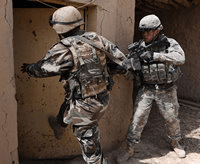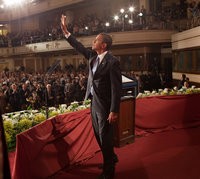World Politics Review contributors John Nagl of the Center for a New American Security and Brian Katulis of the Center for American Progress discuss the conflict of visions for the way forward in Afghanistan with NewsHour’s Ray Suarez. Katulis and Nagl discuss recent discouraging statements by Afghan President Hamid Karzai and how a competing vision for the future of Afghanistan could affect allied forces’ operation there.
Iraq Archive
Free Newsletter
As combat troops withdraw from Iraq, controversial private security firms are coming in to fill the security void, according to the U.S. State Department. Officials say that contractors will be subject to the Afghan legal system this time around, however skeptics remain following the now infamous Blackwater scandal of 2007.
Stuart Bowen, U.S. Special Inspector General for Iraq, says the system that pays contractors for work in Afghanistan is largely to blame for poor work quality, unfinished projects, and gross overspending. The U.S. has spent at least $700 billion on the Iraq war over the last seven years and is expected to continue spending large amounts of tax payer dollars in that country in development, now that combat troops have been withdrawn.

World Politics Review is on a publishing hiatus through Aug. 30. But during this time, we’ll be opening up some of our subscription-only content to non-subscribers. Today we feature an article that was part of our May 4, 2010, feature, “Leaving Iraq: What Comes Next?“ In “Debating Obama’s Withdrawal Timeline,” Gregg Carlstrom wrote that despite President Barack Obama’s insistence on sticking to his withdrawal timetable in Iraq, the debate in Washington over the advisability of that course continued. Even today, as Operation Iraqi Freedom officially ends and the last combat troops leave Iraq, the debate goes on. Carlstrom’s article provides […]

At the beginning of this year, I made the following observation: The novelty of the Obama presidency has worn off. What remains will be a long, hard slog of rebuilding America’s global position. And while the fancy rhetoric of 2009 convinced many to give Washington a second chance, 2010 needs to be the year of delivery. If not, Obama will discover, as Bush did before him, that America cannot lead if others will not follow. More than halfway through 2010, the Obama administration has made some progress on a number of the foreign policy challenges facing the United States. There […]
Writer and scholar Reza Aslan discusses President Barack Obama’s Iran strategy at a United Nations Alliance of Civilizations debate entitled “The Future of Western Relations with the Muslim World.” Aslan says he agrees with Obama’s initial approach to an unstable Iran, however, a shift in Tehran has caused the once solid policy to be on uneven ground.

This week, President Barack Obama reaffirmed U.S. plans to end its combat mission in Iraq at the end of August, and to pull out the 50,000 troops that will remain past that date in a supporting, advisory role by the end of 2011. The president emphatically stated that “we will maintain a transitional force until we remove all our troops from Iraq by the end of next year.” It’s not unreasonable to think of Iraq as the new Lebanon — a fractious and not-so-united nation-state unable to form and sustain coherent governments, and still tottering near the precipice of a […]
In his assessment on how things could have been different in Afghanistan, David Sanger in Sunday’s New York Times repeats one of the fixed assumptions about America’s longest war to date: we wouldn’t be in the current mess in Afghanistan “if only [the Bush administration] had not been distracted by Iraq, or averted [its] eyes from the Taliban’s resurgence.” That’s almost certainly the case. But it turns out that without the Iraq war, the U.S. could well have found itself fighting in Afghanistan without NATO. It was the rapid U.S. advance across Iraq, particularly the fall of Baghdad, that turned […]
In a speech delivered yesterday to the national convention of the Disabled American Veterans, U.S. President Barack Obama reaffirmed his intentions to stick by his plan for withdrawing troops from Iraq. World Politics Review senior editor and senior fellow at the Hudson Institute, Richard Weitz, discusses Obama’s announcement, Baghdad’s readiness to take over operations in Iraq, and the possible ramifications for withdrawal in this CSPAN interview.
